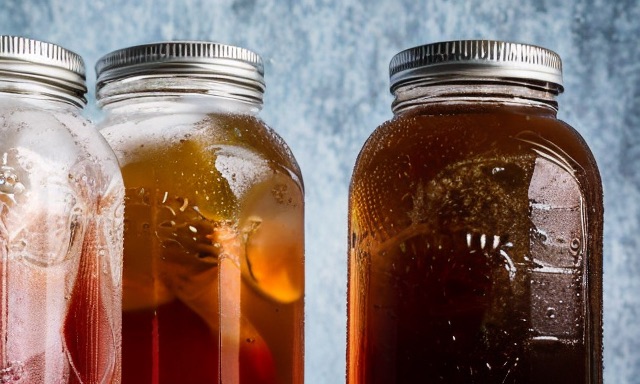Yes, kombucha contains caffeine, though typically less than the original tea it is made from. The amount varies depending on the tea used in fermentation.
Kombucha, a fermented tea boasting probiotics and antioxidants, entices health-conscious individuals with its potential benefits. Originating from Northeast China around 220 B. C. , this effervescent beverage has soared in popularity for its unique taste and purported wellness advantages. The fermentation process, involving a symbiotic colony of bacteria and yeast (SCOBY), slightly diminishes the caffeine content from the initial tea leaves, making it a milder alternative to traditional brews.
As enthusiasts savor kombucha for its tangy flavor profile and digestive perks, understanding its caffeine content helps consumers make informed choices aligning with their dietary preferences and sensitivities. Whether incorporated as a refreshing pick-me-up or a casual sipper, kombucha’s subtle caffeine presence is an important consideration for many.
Kombucha Origins And Basic Composition
Kombucha is a fermented drink with origins in Northeast China.
It is known for its tangy taste and potential health benefits.
Typically, Kombucha involves fermenting sweetened tea using a symbiotic culture of bacteria and yeast (SCOBY).
The brewing process can introduce variable caffeine levels into Kombucha.
This depends on the tea used as a base — typically black or green tea.
These teas naturally contain caffeine.
| Ingredient | Function |
|---|---|
| SCOBY | Ferments the tea |
| Sugar | Feeds the fermentation process |
| Tea | Provides nutrients and caffeine |

Caffeine In Kombucha Explained
Many wonder about kombucha and caffeine. Kombucha does contain some caffeine. This is because kombucha is made with tea. Tea naturally has caffeine. The caffeine level in your kombucha can vary. It depends on several things.
- The type of tea used matters a lot.
- How long the tea steeps will also change the caffeine.
- The amount of tea used in brewing changes the caffeine too.
Black tea typically means more caffeine. Green tea often means less. Remember, fermentation time also plays a role. Shorter time may keep more caffeine.
Measuring Caffeine Levels In Kombucha
Kombucha does contain caffeine, since it’s made from tea. The amount of caffeine can vary. It depends on many factors. One key factor is the type of tea used. Another is the brewing time. Generally, kombucha has less caffeine than a regular cup of tea. Still, it’s not caffeine-free. People sensitive to caffeine should know this.
| Beverage | Caffeine Content |
|---|---|
| Coffee | 95-165 mg |
| Black Tea | 25-48 mg |
| Green Tea | 25-29 mg |
| Kombucha | 10-25 mg |
| Cola | 24-46 mg |
Scientists use specific tools to find how much caffeine a drink has. The most common tool is High Performance Liquid Chromatography (HPLC). It is very accurate. Another method is UV Spectroscopy. This one is faster and less costly. These tools ensure the caffeine content is measured correctly.

Health Implications Of Caffeine In Kombucha
Kombucha is a fizzy drink many people love. It comes from fermenting tea and sugar with bacteria and yeast. Caffeine is in tea. So, Kombucha has caffeine too. A small bit of caffeine can make you alert. Too much might make you restless or disrupt sleep.
Good germs in Kombucha are called probiotics. They help your tummy. Probiotics can fight bad germs. This makes Kombucha a healthy choice. But some worry about caffeine.
Each bottle of Kombucha has less caffeine than a cup of coffee. This can be good or bad. It depends on your body. Knowing this helps you choose better. You can drink Kombucha and feel good about it.
Navigating Kombucha Consumption
Many people enjoy kombucha for its taste and health benefits. Choosing low-caffeine varieties is simple. Look for kombuchas made with green or white tea. These usually have less caffeine. Also, consider options that are decaffeinated.
Be mindful of the serving size. Smaller servings mean less caffeine. Read labels for caffeine content. Brands often provide this information. Enjoy kombucha earlier in the day. This avoids caffeine affecting sleep.
| Type of Kombucha | Average Caffeine Content |
|---|---|
| Traditional (Black Tea) | 15-30 mg per 8 oz. |
| Green Tea Kombucha | 10-20 mg per 8 oz. |
| Decaffeinated Kombucha | 0-5 mg per 8 oz. |

Frequently Asked Questions Of Does Kombucha Have Caffeine
Does Kombucha Have More Caffeine Than Coffee?
No, kombucha typically contains less caffeine than coffee. The caffeine content in kombucha can vary but is generally lower than that found in a cup of coffee.
Will Kombucha Keep Me Awake?
Kombucha contains caffeine, which can disrupt sleep. Its probiotics may aid in digestion but are unlikely to impact alertness. Drinking it close to bedtime could potentially keep you awake.
How Much Caffeine Is In Decaf Coffee Vs Kombucha?
Decaf coffee typically contains 0 to 7 milligrams of caffeine per cup, while kombucha can range from 2 to 25 milligrams per 8 ounces.
Is Kombucha A Stimulant?
Kombucha contains small amounts of caffeine, which can have a mild stimulant effect. Its caffeine content is typically lower than that of coffee or tea.
Conclusion
Understanding the caffeine content in kombucha is vital for mindful consumption. This fermented tea does contain caffeine, but typically less than its source teas. Always check labels for specifics, as brews vary. Embracing kombucha means enjoying its benefits while being aware of its caffeine content for your well-being.

